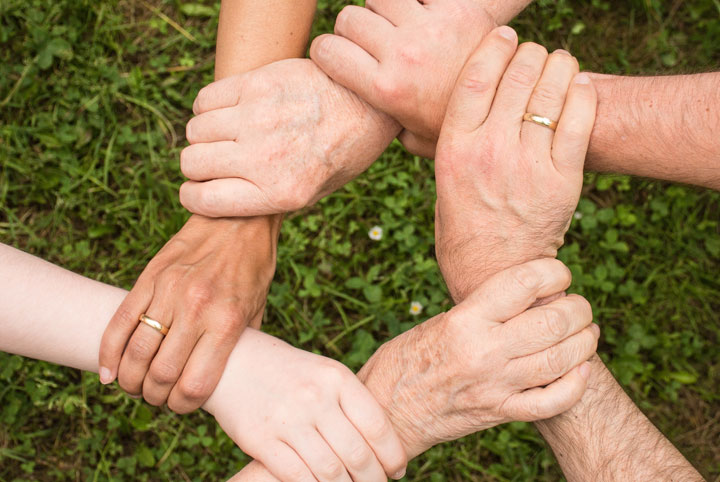
There are lots of reasons people join AA meetings. You’ll find people that only go to meeting because they were told to and there are many that go to all the meeting because they want to. Despite whatever reason you are going to the alcoholic anonymous meeting in your area, you are going to end up with something good out of it. This is what most members say, there are always positive reviews about AA meetings.
Most Cities or towns of any size will have AA meetings. You can look up AA meetings online and it will bring up a site that will show you the nearest location the nearest meetings. After you find a meeting that you can get to, just show up a few minutes ahead of time and present yourself at the door. You can tell the first person you see that you’re new and that you want to attend the meeting. If you’re attending because you want to quit drinking, you automatically qualify for membership.
Like we said before, there are several reasons why there are people that will join the alcoholic anonymous groups beside the fact that they are going to get at least one thing out of it. Some will join alcoholic anonymous so that they are going to be able to get some real help with a drinking problem that they have come to realize that they have. Alcoholics could be people you know and care for, so you might want them to join alcoholic anonymous groups. The problem is that they most likely are not going to admit that they have a drinking problem and and they might think that alcoholic anonymous groups are not going to be able to help them out. An AA group won’t help them until they are willing to admit that they have a problem.
To make a person admit that they have a drinking problem, you are going to need to find a way to make them to see the the damage the problem has caused first (like the broken relationships they might have, lost jibs, temper). Admitting that they have a problem is the only way that the alcoholic anonymous group is going to be able to help them out. Another way to convince them they have a problem is to make a tape or recording of how they act after drinking.
The moment they admit that they have a problem with the drinking, you are going to be able to get them into one of the alcoholic anonymous groups that are in your area. One other thing about the alcoholic anonymous is that all the people stay anonymous unless they are ready to let people know who they are.

First Step
The moment you’re sure that you are an alcoholic, then the first step to take in order to kick the habit is to abstain from drinking as much as possible. Although it might seem easy to tell somebody to cut down on consumption of alcohol, it is impossible for the alcoholic to follow this advice because of the condition that he or she is suffering from. That’s why it’s very important for alcoholics to seek support at these times from people who have managed to or are in the process of kicking the habit and this is the core group forming Alcohol Anonymous.
AA groups are the best kind of support group that anybody can ever think of joining, because it is one of those rare organizations in the world that is apolitical non-denominational and multiracial. Alcoholic anonymous do not have any social, political or religious affiliations and the only affiliation the group has is towards reaching a collective goal of non-alcoholism.

Self-sustaining
AA groups are self sustaining, non- professional organization that is founded, run and managed by past or even current alcoholics, and everybody is free to join . You need no requirements to become a member of an AA group, apart from the inclination to kick alcoholism.
This popular group has the distinction of being the world’s largest self help organization. Like we said there and AA groups can be found in almost every city in the world. The group’s members meet almost every week, where they discuss the problems that they are facing as a result of being alcohol dependent, how they want to kick the habit, how they have managed to get out of the quick sands of alcoholism and what are the positive and negative changes in their lives as a result of alcoholism and as a result of getting rid of it.

Free For All
Alcohol Anonymous membership is free for all. The organization does not solicit members but all are free to come and go as they please. There are no attendance or membership records. However, the organization does have a buddy system, where one person is codependent on the other and vice versa, and each one tries to prevent their partner from getting a relapse.
Thus it is extremely easy to join Alcohol Anonymous and the group therapy that takes place at Alcohol Anonymous meetings is advised by experts for all those who want to get rid of their dependence on alcohol. You can also check out the organization’s local branch by attending a couple of meetings

How to quit drinking without alcoholics anonymous
Alcoholism can be a horrible affliction, one that leads to a lot of harm and destruction in people’s lives. If you have a drinking problem, the sooner you can get sober and stay sober, the better off your life will be.
Of course, quitting drinking is easier said than done. Achieving sobriety is even more difficult for those who have trouble accepting the doctrines of Alcoholics Anonymous (AA) and the 12 step program.
AA has helped many alcoholics in their quest to stop drinking, but the spiritual nature of the program can be a cause of struggle and confusion for many others. It seems that pretty much everyone in this country, including treatment counselors and other health professionals, recommends AA as the only program that works. But if that’s the case, what then are atheists, agnostics, and people who aren’t spiritual supposed to do? If you can’t buy into the program, the program won’t work for you.
Nevertheless, there is hope. Contrary to what many AA supporters and counselors would lead you to believe, it is possible to quit drinking without AA. Many people have done so, and there are resources out there that can help.
Tips to quit drinking without AA
Focus on today – When you start thinking about your entire life and wondering if you’ll ever drink again, it’s easy to become overwhelmed and fatalistic, making it easier for you to give up and give in to cravings. Don’t tell yourself that you’ll never drink again for the rest of your life. Instead, tell yourself that you won’t drink today, and you won’t drink tomorrow. As time keeps going by, just keep the focus on today and not drinking today. It gets easier.
Be open and honest – When you first confront your drinking problem, being honest about it with other people can be hard. You worry that others might judge you or think less of you, and you want to keep it a secret for privacy reasons. But I’ve found that being open and honest was one of the biggest changes that allowed me to stay sober. It takes away the option of drinking again without too many consequences because people will know what is really going on and won’t buy your excuses. This gives you some accountability, which can be very important when getting sober. And you’ll be surprised how sympathetic and supportive most people are. Almost everyone has been touched by alcoholism or addiction in some way, whether it’s themselves, their friends, or their family, and people will respect that you’re being honest about it and doing something about it.
Time sober becomes its own motivation
The first few months are always the hardest, and slips and relapse are very common. If this happens, don’t give up. If you can get a few months sober, you find that this becomes its own motivation. If you reach six months, you’ll hesitate about giving that up for a stupid drink because you’ll know you’re throwing that hard work away and you’ll just have to start over again. And as you keep reaching milestones, it becomes even easier.
Some seek the option of private rehab help, e.g. Abbeycare’s alcohol and drug rehab Bristol to help take a more structured approach to treatment, and get professional supervision during the first initial stages of detox and treatment.
One thing is for sure, life is a lot better without the haze of alcohol and the web of destruction and regrets that alcohol creates. AA is one way to get sober, but it’s not the only way. And if you want to quit drinking without AA, there is help.

How can we assess the success rate of alcoholics anonymous?
There are major problems to consider when trying to measure the success rate of Alcoholics Anonymous is his to calculate success. Are you referring to complete abstinence for life? You can be sure, there’s no accurate way to study that. Or are you referring to alcoholics who make it 1 year sober? 5 years? Are you talking about the number of members who have not relapsed? What about one relapse, does that count? Is relapsing and returning to AA to continue working toward sustained sobriety a failure? Or are you referring to those who manage to get sober after multiple relapses?
Measuring all these is a difficult thing to do as the fellowship is meant to be anonymous and AA’s own reports may be affected by various factors.
Determining and estimating the success of AA is tricky, especially since the membership numbers are constantly changing. To begin with, the Big Book claims AA has almost a 50 percent success rate, with another 25 percent staying sober after relapsing once or several times. One survey taken in 2014 provides the following statistics about alcoholics anonymous:
- About twenty seven percent of AA members stay sober for less than a year
- About twenty four percent of AA members stay sober between one and 5 years.
- About thirteen percent of Alcoholics Anonymous members stay sober between 5 and 10 years.
- About fourteen percent of Alcoholics Anonymous members stay sober between 10 and 20 years.
- About twenty two percent of AA members stay sober 20 or more years.
Ten years is the average amount of time an AA member stays sober, but some people still argue that the success rate is between five and ten percent.
Some research has been conducted to investigate the success rate of AA, like the one that took a look at the long-term sustained sobriety of individuals who had received formal treatment, attended AA, or had not received any treatment at all. Overall, the study found:
At the end of three years, half of the AA members were still sober and 0.25 percent of those who enrolled in formal treatment were still sober.
At the end of 8 years, 49 percent of AA members were still sober and 46 percent of people who enrolled in formal treatment were still sober.6
The findings of this study indicate that AA can be very effective for some people who are seeking long-term recovery from addiction.
3 Important Factors that Influence the AA Success Rate
As with other measurement of success, there are certain factors that come into play. From all the research taken to identify the AA success rate, there are a few main factors that will influence whether an individual may achieve sobriety success through the program.
- The absence of proper addiction treatment; with the inclusion of AA participation, whether or not a person has also received some type of formal treatment may have an impact on their success in AA. Just imagine an individual who attends AA and is also enrolled in a sober living program, that person will have more sobriety support than someone who attends AA but lives at home with family members who abuse alcohol.
- Adherence to the rules of the AA program : the achievement of sobriety can depend on whether va person sticks to the 12 step program. It’s possible to be a dry drunk and an AA member without ever actually experiencing the personal and spiritual transformation that AA is designed to produce. Achieving sobriety through AA will require hard work, perseverance, and daily dedication to the program.
- Attendance at AA meetings: As with most group meetings, a major part of AA is attending group meetings on a regular basis, individuals who do not attend one or more meetings every week may not benefit from the program, whereas someone who attends two AA meetings each week is much more likely to achieve lasting success in sobriety.

The Role of AA in Addiction Recovery
One study conducted on AA members in 2014 found that, 59 percent of AA members received some type of treatment or counseling related to their drinking and 74 percent said it played an important part in directing them to AA.
Another finding was that after coming to AA, 58 percent of members received some type of treatment or counseling and 84 percent said it played an important part in their recovery from alcoholism.
One vital piece of information to take from these statistics is that the 12-Step Program can play a vital role in the addiction recovery process, but people in recovery may have a better chance at achieving sustained sobriety if they also enroll in a formal addiction treatment program.
There are some places where, attending 12-step meetings is an important part of the recovery program. Research indicates that it is just as effective as other treatment approaches like cognitive behavioral therapy and motivational enhancement therapy, and it provides more opportunities for sober living residents to get connected with their sober peers.
Creatinga reliable platform for recovery is an essential part of maintaining long-term sobriety and AA can help people in recovery do that. Since alcoholics anonymous is a group that focuses on improving character deficits in addition to problem drinking, the 12-Step Program also helps sober individuals develop productive habits, life skills, and maintain a healthy mindset in recovery.
Although there are people that avoid AA due to its spiritual nature, however, the 12-Step Program can be adapted to suit individuals of all religious and non-religious beliefs and one can choose anything (not just the Christian God) to become their “higher power” in recovery.

What happens at AA meetings
For those who have never attended an Alcoholics Anonymous meeting, you may be wondering what to expect when you first walk through the doors. One thing to remember is that there’s no need to feel embarrassed or ashamed that you’re here. All the people present have been in your shoes, and they understand what it’s like to be new.
Now there are different types of AA meetings and they depend on the occasion and the people present at the meeting. There are meeting guide lunes, now there are online and you can seethe time, play s and types of meetings available. There are open and close meetings, open for anyone such as alcoholics, supporters such as spouses, students, someone who has been sent by the court for drunk driving. Then you have the closed meetings which aren’t open to members of the public and are usually formed by members who want an environment where they can be more open and honest. You can only be invited to closed meetings if you are present open ones, from there you can get invited.
At the meetings, people tell the story of their drinking problem, how they got into AA and what has happened since. There are discussions where topics are picked and people talk about them. There are also literature meetings where, they talk about AA literature. There are male meetings, female meetings, gay meetings, meetings at the park, conferences and conventions. You might be shocked at the amount of laughter in some meetings, people usually think it’s a sombre affair but it doesn’t have to be. There is also coffee available, as the membersay like to have something to drink.
You do not have to talk all call yourself an alcoholic at such meetings, you can just come to and open meeting and just sit and listen. A meeting will usually begin with a chairperson who will open and close the meeting. They will give the general announcement for the group and they maycread a few pages. Then the meeting will start. By the end of the meeting they will pass a basket for donations. Every meeting is self supporting, so that is how they pay for rent and the coffee etc. There are no dues for membership in AA.
They are also anonymous like the name implies. You don’t have to give your last name, your real names, identity your job or anything. Through AA manyvyave found that alcoholism is a treatable disease and manyvhave been sober for years now. At meetings they recite the Lord’s prayer, though AA is not affiliated with any church, these are just prayers that have been used in the meetings since the 1930s and 40s.
Some Rules
The meetings in this group are well organized despite the fact that there are not many rules. But there is one things you don’t do at meetings and that is called ‘crosstalk’, where you are disrespectful to others who are speaking. It’s not appropriate to interrupt a person who is speaking their mind and never give direct advice or your opinions to another member.
